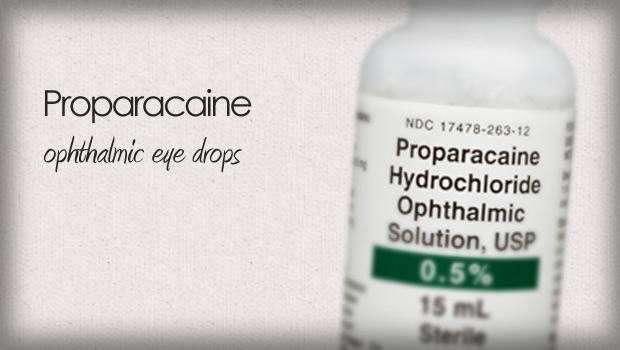Proparacaine
Proparacaine ophthalmic eye drops (pro-PAIR-uh-cane) Other Names: Ak-Taine, Alcaine, Ophthetic Why is proparacaine prescribed? Proparacaine is used in the eye as […]


Proparacaine
Proparacaine ophthalmic eye drops (pro-PAIR-uh-cane) Other Names: Ak-Taine, Alcaine, Ophthetic Why is proparacaine prescribed? Proparacaine is used in the eye as […]
Proparacaine ophthalmic eye drops
(pro-PAIR-uh-cane)
Other Names: Ak-Taine, Alcaine, Ophthetic
Why is proparacaine prescribed?
Proparacaine is used in the eye as an anesthetic to numb the pain that may occur during eye procedures (eye surgery).
HOW should this medication be used?
This medication should be placed in the eye(s) usually just before a surgical procedure or is used as directed by your doctor. It may be necessary to repeat a dose every 5 to 10 minutes but prolonged use is not recommended. Dosage is based on your medical condition and response to therapy. Proparacaine is typically used in a clinical environment and not prescribed for home use.
What special PRECAUTIONS should I follow?
Tell your doctor your medical history, especially of any other eye problems (e.g., cataracts, infections) and of any allergies you may have. Prolonged use of eye anesthetics is not recommended; doing so could cause permanent eye problems (e.g., corneal opacities) or loss of vision. This medication should be used only when clearly needed during pregnancy. Discuss the risks and benefits with your doctor. It is not known if this medication passes into breast milk. Consult your doctor before breast-feeding.
Tell your doctor of all prescription and nonprescription medication you may use, especially of other eye medications (drops or ointments). Do not start or stop any medicine without doctor or pharmacist approval.
This medication may be harmful if swallowed. Symptoms of an overdose may include, loss of vision or irregular heartbeat.
What SIDE EFFECTS can this medication cause?
Redness, burning, or stinging of the eye(s) may occur. If these effects persist or worsen, notify your doctor.
Tell your doctor immediately if any of these serious side effects occur: eye pain, eye swelling, vision changes.
Tell your doctor immediately if dryness or cracking of the skin on the fingertips occurs. This may be a sign of a skin allergy (e.g., allergic contact dermatitis). If you notice other effects not listed above, contact your doctor or pharmacist.
What OTHER INFORMATION should I know?
Make sure that your doctor is aware of any and all medications that you are taking.
Do not let anyone else use your medication. Ask your pharmacist or doctor if you have questions about your medication.






